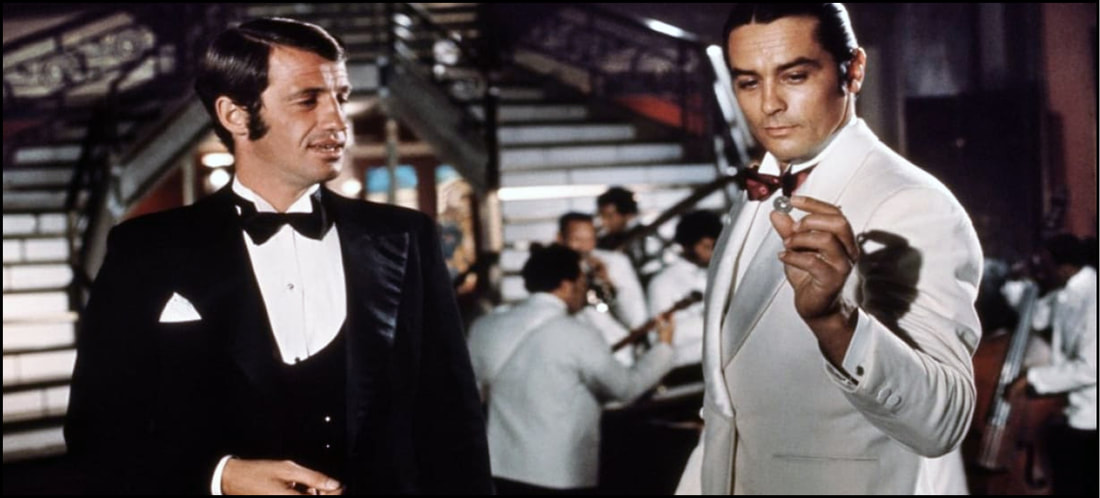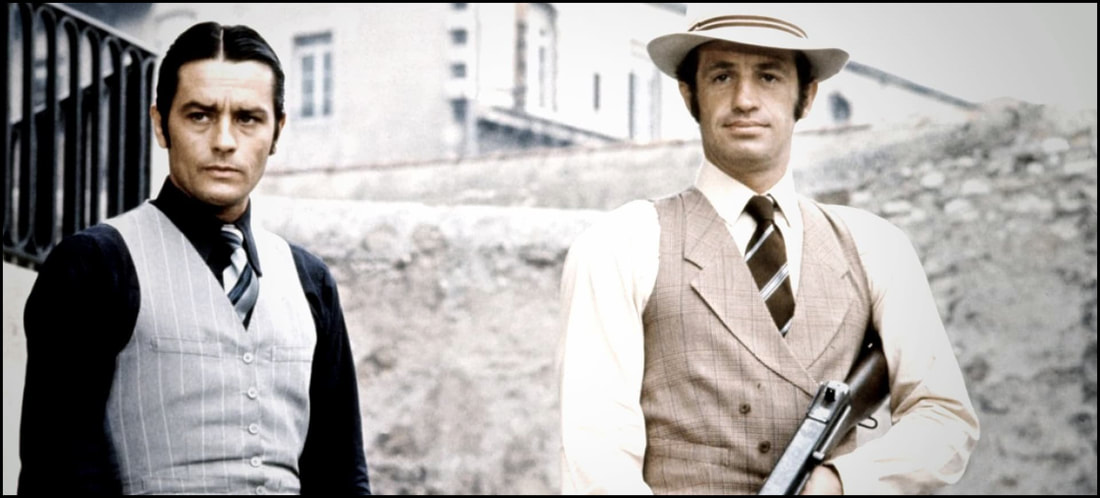On occasion, I’ve mentioned some of my other interests on SciFiHistory.Net. As a longtime student of film, I obviously gravitate toward Science Fiction, Fantasy, and Horror – along with anything noir and neo-noir – but my fascinations don’t stop there. As one who has done more than a fair share of reading on crime – in particular, just about anything emerging as a serious study of American Prohibition and the early days of gangsterism draws my attention – I’d heard of Borsalino but never had the good fortune of seeing it. Given the fact that it takes place in the 1930’s and delivers a tale based on the real-life exploits of mobsters Francois Capella and Roch Siffredi, I just couldn’t pass up this opportunity when it came to me via a distributor relationship.
So … no. Absolutely no. It has nothing to do with Science Fiction or Fantasy or Horror. And – being frank – it has no noir sensibilities combined in visual crafting of it for the screen, much like Martin Scorsese or Brian De Palma might incorporate in their various projects. For the most part, Barsalino is a reasonably conventional crime/drama … but it does boast two of the coolest leading man performances in that unique sub-genre, making it arguably a theatrical feature worth a reflection by yours truly.
(NOTE: The following review will contain minor spoilers necessary solely for the discussion of plot and/or characters. If you’re the type of reader who prefers a review entirely spoiler-free, then I’d encourage you to skip down to the last few paragraphs for the final assessment. If, however, you’re accepting of a few modest hints at ‘things to come,’ then read on …)
From the film’s IMDB.com page citation:
“In 1930 Marseilles, two small-time crooks join forces when they meet brawling over a woman. Starting with fixed horse races and fights, they start to find themselves doing jobs for the local gangster bosses. When they decide to go into the business for themselves, their easy-going approach to crime starts to change.”
As I highlighted above, crime stories have long been a leisure-time pursuit for me; and – having read about many of them over the years – Borsalino has often dropped onto my radar. In fact, it’s the kind of performance that is almost always mentioned in the same breath as George Roy Hill’s seminal Butch Cassidy And The Sundance Kid (1969) – a flick I don’t like nearly as much as all of mankind, it would seem – because of the many tonal and aesthetic similarities. You have two charismatic leads. You have both humorous and dark reflections on acts of crime. And there’s a growing sense of unease along the way that eventually both pairs are going to either run out of luck or bullets at the worst possible time. While the conclusions are similar, Borsalino only goes halfway (snicker snicker) to achieving what Cassidy and Sundance do in their swan song, paving the way for what I’ve been told is an inferior sequel – Borsalino And Co. (1974) – that lacked so much of the charm that made the original pairing a success with audiences.
And – yes, for what it’s worth – the two have a magnetism that elevates the film and clearly helped it gain popularity with audiences who’ve discovered it around the world. (Wikipedia.org reports that Borsalino never achieved the attention producers hoped in America, a shame given the fact that Paramount Pictures apparently financed a great degree of the effort.) Much like Cassidy and Sundance, it’s damn near impossible to conceive of two other actors in these central roles; Belmondo and Delon achieve nothing short of shared brilliance in every scene. Delightfully, there’s an effortlessness to the chemistry, and a film fan like me can’t imagine a day these two men couldn’t make nice and get along. Their work exudes the coolness required of mobster portrait, and I think it should be required viewing for anyone even considering like-minded fare.
Setting aside my praise, I’d have to point out that I wasn’t a fan of the score. Much of this is backed by a tinny mechanical piano – tunes played out with a sense of mirth if not childlike fascination – and that seems all wrong. While some of their criminal acts early on have a tongue-in-cheek feel, the picture grows increasingly dark, and the central idea about change really need to be punctuated with something perhaps more symphonic and less wry. That kind of thing worked just fine for the other Redford/Newman pair-up The Sting (1973) mostly because such a great deal of it was comic. Perhaps Deray should’ve hired someone other than Claude Bolling for this or, minimally, had pushed the composer for something a bit more perceptive.
Yet – as mentioned – change remains the undercurrent that propels so very much of this particular story. The criminals start out as essentially harmless charlatans engaging in acts at the behest of some true gangland heavies; as the story grows, so does Capella and Siffredi’s desire for a piece of the action (as they say), and this necessitates they up their game to the point of using sharp points and blazing lead in lieu of harmless kidnapping and harsh words. Once the society they move within begins to follow suit, it becomes clear that they’ve found themselves on a path few escape with their lives. Though a dark fate befalls only one of our beloved pair, it’s clear that survival will always be a game played at great risk.
Borsalino (1970) was produced by Adel Productions, Marianne Productions, and Mars Film. DVD distribution (for this particular release) has been coordinated by the fine folks at Arrow Films. As for the technical specifications? Though I’m no trained video expert, I thought that the sights-and-sounds to this presentation were all very good; I’ve searched online and can’t find any indication of this being a re-mastering, so apologies if it was and I’m not mentioning it. Lastly, if you’re looking for special features? The disc boasts an audio commentary by Josh Nelson (very dry so I didn’t finish it), some featurettes exploring costumes and music, the theatrical trailer, and an image gallery. It’s a good assortment but nothing all that grand.
Recommended.
In the interests of fairness, I’m pleased to disclose that the fine folks at Arrow Films provided me with a complimentary Blu-ray copy of Borsalino (1970) by request for the expressed purposes of completing this review. Their contribution to me in no way, shape, or form influenced my opinion of it.
-- EZ



 RSS Feed
RSS Feed